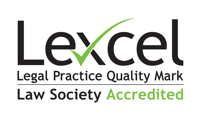
HCPC Defence Lawyers for HCPC Investigations, Referrals, Hearings & Tribunals
Put your trust in Clifford Johnston & Co.
- HCPC Investigations & Defence Expertise
- Experts in Misconduct Allegations & HCPC Sanction Appeals
- Talk to a Specialist HCPS Lawyer Today
- Lexcel & Law Society Accreditated
HCPC Defence Lawyers & Solicitors for HCPC Investigations & Hearings
If you’ve been referred to the HCPC, the possible sanctions you are facing have serious implications for your registration and livelihood, potentially ending your career. Our HCPC Lawyers have extensive experience of defending registrants in fitness to practise investigations by the HCPC and proceedings before the Health and Care Professions Tribunal Service (HCPTS).
Our dedicated HCPC Solicitors have vast experience of dealing with a wide range of HCPC Investigations, including allegations of serious misconduct and poor professional competence.
If you find yourself being investigated by the HCPC, please get in touch with us. It is important that you speak to Lawyers specialising in HCPC Investigations as soon as you become aware that you are being investigated.
We have an impressive track record in defending professionals before the main regulatory bodies, including the HCPC. We are instructed by professionals across the UK and by all the major trade unions to represent their members. Contact Clifford Johnston today to speak to one of our specialists HCPC Defence Lawyers.
Why choose Clifford Johnston & Co?
We understand the severity and potential life changing consequences of a referral to the HCPC. We recognise that a sanction may have a significant effect on your personal life, career, profession and reputation that you have worked so hard to earn.
Whatever the allegation, our dedicated HCPC Lawyers are here to help. We can guide you through the process and advise you on the best approach at each stage of your case.
Although based in Manchester and Stockport, our Lawyers have developed a national professional discipline practice and represent professionals across the UK.
What is the HCPC?
The HCPC’s role is to safeguard the health and well-being of persons using or needing the services of registrants by investigating complaints and taking appropriate action to ensure that their members are fit to practise.
The Health and Care Professions Council (HCPC) is the statutory regulator responsible for the regulation of members of 15 professions, namely:
Paramedics
As frontline emergency responders, paramedics must make critical decisions under pressure. Allegations of professional misconduct or clinical errors can have serious consequences. Our Paramedic Defence Lawyers provide expert representation to safeguard your career.
Physiotherapists
Physiotherapists help patients recover from injuries and mobility issues, but complaints about treatment outcomes, competency, or professional conduct can lead to HCPC scrutiny. Our Physiotherapist Defence Lawyers can help protect your registration and reputation.
Occupation Therapists
Whether facing concerns about treatment methods, patient safety, or ethical boundaries, occupational therapists may be subject to HCPC investigations. Our Occupational Therapist Defence Lawyers are here to support and defend you at every stage.
Radiographers
Radiographers play a crucial role in medical diagnostics, and errors in imaging or breaches of professional standards can result in HCPC proceedings. Our Radiographer Defence Lawyers offer specialist legal support to protect your professional standing.
Arts Therapists
Arts therapists work closely with vulnerable individuals, making them susceptible to complaints regarding conduct or therapeutic methods. Our Arts Therapist Defence Lawyers can provide the defence you need to continue your practice.
Biomedical Scientists
Biomedical scientists are essential to clinical diagnostics and research, and allegations of laboratory errors, misconduct, or ethical breaches can be career-threatening. Our Biomedical Scientist Defence Lawyers are experienced in handling HCPC investigations.
Chiropodists & Odiatrists
Patient care concerns, treatment outcomes, and professional competency issues can lead to HCPC scrutiny for chiropodists and podiatrists. Our Chiropodist Defence Lawyers offer expert legal support to protect your career.
Clinical Scientists
Clinical scientists are responsible for critical diagnostic and research processes, meaning any accusations of professional misconduct or negligence can have serious implications. Our Clinical Scientist Defence Lawyers provide expert guidance through HCPC investigations.
Dieticians
Dieticians offer vital health advice, but complaints about professional competence or misleading information can trigger HCPC action. Our Dietician Defence Lawyers can help you navigate regulatory challenges and safeguard your registration.
Hearing Aid Dispensers
Allegations of improper device fitting, misdiagnosis, or ethical breaches can result in an HCPC referral for hearing aid dispensers. Our HCPC Lawyers advise and represent Hearing Aid Dispenser Practitioners facing regulatory proceedings.
Operating Department Practitioners
Working in high-risk surgical environments, operating department practitioners may face allegations of misconduct or clinical errors. Our Operating Department Practitioner Defence Lawyers provide strategic legal defence for HCPC cases.
Practitioner Psychologists
Confidentiality breaches, ethical concerns, or treatment disputes can put practitioner psychologists under HCPC investigation. Our Practitioner Psychologist Defence Lawyers offer expert legal representation to protect your professional reputation.
Prosthetist & Orthotists
Prosthetists and orthotists provide life-changing care to patients, but allegations of substandard treatment or poor clinical judgement can lead to disciplinary action. Our Prosthetist and Orthotist Defence Lawyers are here to support your case.
If a registrant’s fitness to practise is impaired, it means that there are concerns about their ability to practise safely and effectively. This may mean that they should not practise at all, or that they should be limited in what they can do.
More information on the role of the HCPC can be found here.
The types of cases that the HCPC consider are those that suggest a registrant’s fitness to practise may be impaired by one or more of the following factors:
- Misconduct – behaviour which falls short of what can reasonably be expected of a registrant;
- Lack of competence – lack of knowledge, skill and judgement, usually repeated and over a period, which means a registrant is unfit to practise;
- A conviction or caution for an offence in the UK (or somewhere else for an offence that would be a crime if committed in England and Wales);
- Physical or mental health – usually an untreated or unacknowledged physical or mental-health condition.
- A decision made by another regulator responsible for health or social care.
The HCPC can also consider allegations about whether an entry to their Register was made fraudulently or incorrectly. This might be the case if, for example, a registrant gave false information when they applied to be registered.
What happens during an HCPC Investigation?
The HCPC will first decide whether the concern is a matter that they can deal with. This is known as the triage stage. If the HCPC decides that they can deal with the concern, they will carry out an initial investigation. This may involve gathering information from many sources.
You will be told about the concern and the HCPC will allocate a case manager who will keep you (and the complainant) up to date with the progress of their investigation.
The role of the case manager is to manage the progress of the case throughout the process and to gather relevant information.
Once the HCPC has completed their initial investigation, they will assess the concern against their threshold criteria for fitness to practise investigations. This is to decide whether the concern amounts to an allegation that your fitness to practise may be impaired.
If the HCPC finds that the concern does meet their threshold test, they will refer the matter to their Investigating Committee.
You can find a copy of the threshold criteria here.
If you’re a healthcare professional facing an HCPC investigation or HCPC registration issues, you need a specialist HCPC Solicitor on your side.
HCPC Investigation Committee
If the HCPC decides that the threshold criteria is met, the HCPC will draft formal allegations and refer them to a panel of their Investigating Committee, who will consider if there is a case to answer.
You will be sent the allegations, together with a bundle of documentation, and you will be invited to respond, in writing, within 28 days of their letter. If you need more than 28 days, you may ask for an extension of time.
This is a very important stage in the case and, therefore, it is very important that you speak to experienced HCPC Solicitors. In our experience, poorly drafted representations can make matters significantly worse. However, a carefully drafted response may be enough to bring the HCPC investigation to an end. It is essential that you obtain legal advice and speak to a specialist Lawyers before responding to the HCPC.
We can, at this stage, assist with collating a response which may include drafting submissions, a timeline of events leading up to the incident(s) in question, a reflective piece, character references, evidence of learning and of any action that you have taken to improve your practice including up to date training courses and records.
After you have had the opportunity to respond, the Investigating Committee Panel, made up of at least 3 people (including someone from the same profession as you), will decide whether there is a ‘case to answer’.
An HCPC Investigating Committee Panel can:
- request further information;
- decide that there is a ‘case to answer’ (which means they will refer your case to a final hearing); or
- decide that there is ‘no case to answer’ (which means that the investigation comes to an end).
You will be notified of the panel’s decision in writing.
What is a HCPC Consent Order?
Consent orders can be applied in cases where you admit the allegation in full and where there is no public interest in holding a fully contested hearing. The process allows you to provisionally agree to a proposed outcome with the HCPC which will then be considered by a panel.
The panel will either approve the proposed outcome or refer your case to a fully contested hearing.
If a consent order is agreed, a final hearing will still take place and information about the case will still be in the public domain. However, it can be dealt with much more quickly.
A caution, conditions of practice order and suspension order can all be agreed by consent.
HCPC Interim Orders
The purpose of an HCPC Interim Orders Hearing is to consider if your registration should be suspended or be made subject to conditions, pending the outcome of the HCPC investigation.
The HCPC will apply for an interim order if they believe that concerns about your fitness to practice are so serious that public safety would be put at risk, or there would be a risk to the public interest or to you yourself.
You will normally be given only seven days’ notice of the hearing, but even that could be shortened.
The interim orders panel will decide whether the allegation is serious enough for an interim order. The panel can:
- make no order;
- impose conditions on your registration;
- suspend your registration.
If you are made subject to an interim order, another panel will review it after six months and then every three months after that. You can also apply for an early review of the order.
You can find more information about interim orders here and here.
This is another vital stage in the process as it could result in you being unable to work in your chosen profession.
Our team of expert HCPC Defence Lawyers will rigorously defend you before an HCPC Interim Orders Panel.
Health and Care Professions Tribunal Service (HCPTS)
If the Investigating Committee Panel determines there is sufficient evidence, the matter will proceed to a final hearing before the HCPTS.
If the issue involves misconduct, lack of competence, criminal convictions or cautions, or decisions by other regulators, it will be referred to a panel of the Conduct and Competence Committee.
If concerns are raised about your health affecting your ability to practise, the matter will be addressed by the Health Committee.
The HCPC usually instructs Solicitors to prepare and present their arguments at the final hearing.
During the hearing, the HCPC will outline their position and call witnesses who can be cross-examined on your behalf. Similarly, you or your Lawyers will present your evidence, call witnesses, and make statements to the panel.
After hearing all the evidence, the panel must decide whether:
- the HCPC has proved the facts set out in the allegation against you;
- if so, whether the facts amount to the ‘grounds’ set out in the allegation (for example, misconduct or a lack of competence); and
- whether your fitness to practise is impaired.
HCPTS Impairment Stage
If the panel decides that the facts are proved and that they amount to the ‘grounds’, they will go on to consider whether your current fitness to practise is impaired.
In deciding whether your fitness to practise is impaired, the panel will take into account factors such as reflection, insight, remediation and whether you are likely to repeat the behaviour.
What sanctions can the HCPTS impose?
The HCPTS will listen to submissions from you or on your behalf in relation to the appropriate sanction. They will consider aggravating and mitigating features before deciding upon an appropriate sanction. Mitigation may include previous good performance, personal circumstances, insight, remediation and length of time since the incident. Aggravating features can include previous findings of serious misconduct and/or poor professional performance in addition to lack of insight and remediation.
The HCPCTS panel can impose the following sanctions:
- take no further action or order mediation;
- caution you. This involves placing a warning against your name on the Register for between one to five years;
- Conditions of Practice order for no longer than three years;
- suspend you from practice for up to 12 months (suspend your name from the register);
- strike (erase) your name from the HCPC Register (which means you cannot practise).
You can find the sanction policy here.
Will the HCPTS decision and reasons be made public?
After the hearing, the HCPC will write to you and send you a copy of the panel’s decision. The panel’s reasons for their decision is usually published on their website. If the case has involved any particularly sensitive information about your health or personal circumstances, a redacted version of the panel’s decision will be published.
The HCPC normally removes hearing decisions from the website within set timescales. You can find these timescales here.
Can a HCPC conditions of practice order and/or suspension order be reviewed?
If you are subject to a conditions of practice order or suspension order, another panel will review it shortly before it is due to expire. For example, if you were asked to meet conditions of practice, the panel will look for evidence that you met these conditions.
If you are subject to a suspension order, the panel will look for evidence that you have dealt with the problems that led to your suspension.
A review panel has the power to extend your conditions of practice order or suspension order. They may also replace the order with another order that could have been made at the time of your original hearing. For example, they may replace a ‘suspension order’ with a ‘conditions of practice order’ if they think this provides enough public protection. They may also consider continuing the suspension order or striking you off the Register.
If your circumstances have changed since the order was put in place, you can apply to have an order reviewed early too.
Can I appeal a decision of the HCPTS?
Yes. You can appeal against the panel’s decision to the High Court or the Court of Session in Scotland. If you wish to appeal, you must do so within 28 days from the date on which the relevant decision was made. The time limit can only be extended in exceptional circumstances.
You can find out more information about HCPC appeals here.
If you are struck off the Register, you can apply for restoration after five years. A hearing will be held by a panel to consider your application.
How long does a HCPC investigation take?
The HCPC aims to have a case considered by the Investigating Committee within eight months of receiving a concern that meets their threshold. The HCPC also aims to hold a final hearing within nine months of the Investigating Committee panel’s decision that there is a case to answer.
How can we help you with an HCPC Investigation?
- Consideration of the HCPC’s bundle of evidence and advising you upon it;
- Preparation of written responses to the Investigation Committee;
- Advice and representation at interim orders hearings;
- Advice in relation to ‘consent orders’;
- Preparation of your case before the HCPTS;
- Collating a defence bundle of documents;
- Representation at fitness to practise hearings before the HCPTS;
- Representation before the HCPTS Health Committee;
- Advice and representation in relation to appeals to the High Court;
- Representation at substantive order review hearings;
- HCPC registration advice on appeal;
- Inquests;
- Police investigations;
- Criminal/Court proceedings for HCPC registrants.
Contact Us
We are proud of the service we give and the impact we make for our clients.
If you need advice or representation at any point, from the initial complaint to the HCPC to the final HCPC Committee hearing, please call and speak to one of our regulatory solicitors.
We can make a difference.
Call today or complete the enquiry form and we will get back in touch with you quickly. We will always respond promptly and we will be happy to help.

Need some professional advice?
Do you have any issues that you are worried about? Contact our professional team for a free, no-obligation informal discussion, where we can discuss your particular requirements in greater detail.













